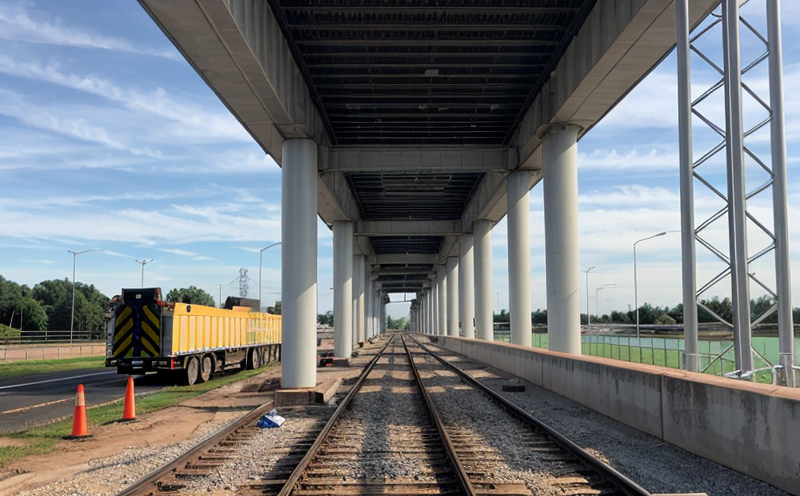Infrastructure Testing
In the realm of building and infrastructure testing, Infrastructure Testing stands as a cornerstone for ensuring structural integrity, safety, and compliance. This service involves a comprehensive suite of tests designed to evaluate the durability, strength, and performance of various construction materials and structures. Our expertise in this area is critical for sectors ranging from civil engineering to urban planning.
The scope of infrastructure testing encompasses a wide range of services including non-destructive testing (NDT) techniques such as ultrasonic testing (UT), radiographic testing (RT), and eddy current testing (ECT). These methods are used to inspect materials without causing damage, ensuring that critical components like pipelines, bridges, and buildings meet stringent quality standards.
For instance, in the case of a bridge inspection, we employ UT to identify potential cracks or flaws within the metal structure. This non-invasive approach helps in maintaining the integrity of the infrastructure while minimizing disruption during operational phases. Similarly, RT is used for weld inspections where radiographs are taken to ensure that joints meet the specified quality criteria.
In addition to NDT techniques, we also conduct destructive testing on materials and components to assess their strength under various loads. This involves breaking specimens in controlled environments to simulate real-world conditions. For example, concrete cylinders may be subjected to compressive strength tests according to ASTM C39/C39M-21 standards.
The importance of infrastructure testing cannot be overstated. It ensures that structures and materials are fit for purpose and comply with relevant international standards such as ISO 9760, EN 14580, and AS/NZS 4620:2007. These tests not only protect public safety but also enhance the longevity of infrastructure projects.
Our team of highly skilled professionals uses advanced instrumentation and software to conduct these tests with precision. The data collected is meticulously analyzed to provide detailed reports that can guide decision-making processes in project management, maintenance schedules, and future design improvements.
By leveraging our expertise in infrastructure testing, clients benefit from enhanced safety measures, reduced risks of failure, and optimized resource utilization. This ensures that every structure built or maintained meets the highest quality standards, contributing to sustainable development goals within the sector.
Why It Matters
The significance of Infrastructure Testing extends beyond mere compliance; it plays a pivotal role in safeguarding public safety and promoting long-term sustainability. The infrastructure we build today will determine how resilient our communities are against natural disasters, climate change impacts, and other environmental pressures.
- Risk Mitigation: By identifying potential weaknesses early through testing, costly repairs or replacements can be avoided, saving both time and money.
- Safety Assurance: Ensuring that all components meet required standards helps prevent accidents and injuries associated with unsafe structures.
- Durability Enhancement: Through rigorous testing, we help extend the life span of critical infrastructure, reducing the frequency of maintenance intervals.
- Sustainability Focus: Sustainable practices integrated into the testing process contribute towards minimizing environmental impact throughout the lifecycle of an asset.
The benefits are clear; not only do we uphold ethical standards but also foster innovation by pushing boundaries in material science and construction techniques. In doing so, we play a vital role in shaping safer, more sustainable environments for future generations.
Environmental and Sustainability Contributions
Incorporating environmental considerations into infrastructure testing is increasingly important as societies become more conscious of their carbon footprints. Our commitment to sustainability aligns with global initiatives aimed at reducing emissions while enhancing efficiency across all stages of project lifecycle management.
We utilize energy-efficient equipment and processes whenever possible, thereby minimizing operational impacts on local ecosystems. Additionally, we promote recycling efforts by reusing test samples where appropriate, thus contributing positively towards waste reduction goals.
Moreover, our services support compliance with international frameworks like the Paris Agreement, which focuses on limiting global warming to well below 2°C above pre-industrial levels. By adhering strictly to these guidelines during testing procedures, we contribute meaningfully to broader environmental conservation efforts.
Achieving harmony between human development and ecological balance requires collaboration across industries. As part of this collective effort, our infrastructure testing service provides essential data used in developing policies aimed at fostering green growth patterns globally.
Competitive Advantage and Market Impact
The competitive landscape within the building and infrastructure sector is dynamic, characterized by evolving regulatory requirements and heightened expectations regarding quality assurance. Our infrastructure testing service offers a distinct advantage through its cutting-edge methodologies and unwavering commitment to excellence.
- Advanced Technology: Leveraging state-of-the-art NDT technologies ensures accurate detection of defects early in the process, giving us an edge over competitors who rely on outdated practices.
- Comprehensive Coverage: Offering a full spectrum of testing services—from initial design verification to final acceptance inspections—ensures comprehensive coverage throughout every stage of construction.
- Detailed Reporting: Providing detailed reports that include actionable insights enables informed decision-making, leading to better project outcomes and improved stakeholder satisfaction.
- Expertise & Compliance: Our team comprises certified professionals who stay updated with the latest industry trends and regulatory changes, ensuring full compliance at all times.
This comprehensive approach has allowed us to establish ourselves as leaders in this field. Our reputation for reliability and innovation attracts clients seeking reliable partners capable of delivering high-quality results consistently. This unique combination of technical prowess and service excellence sets us apart from others operating within the same space.





